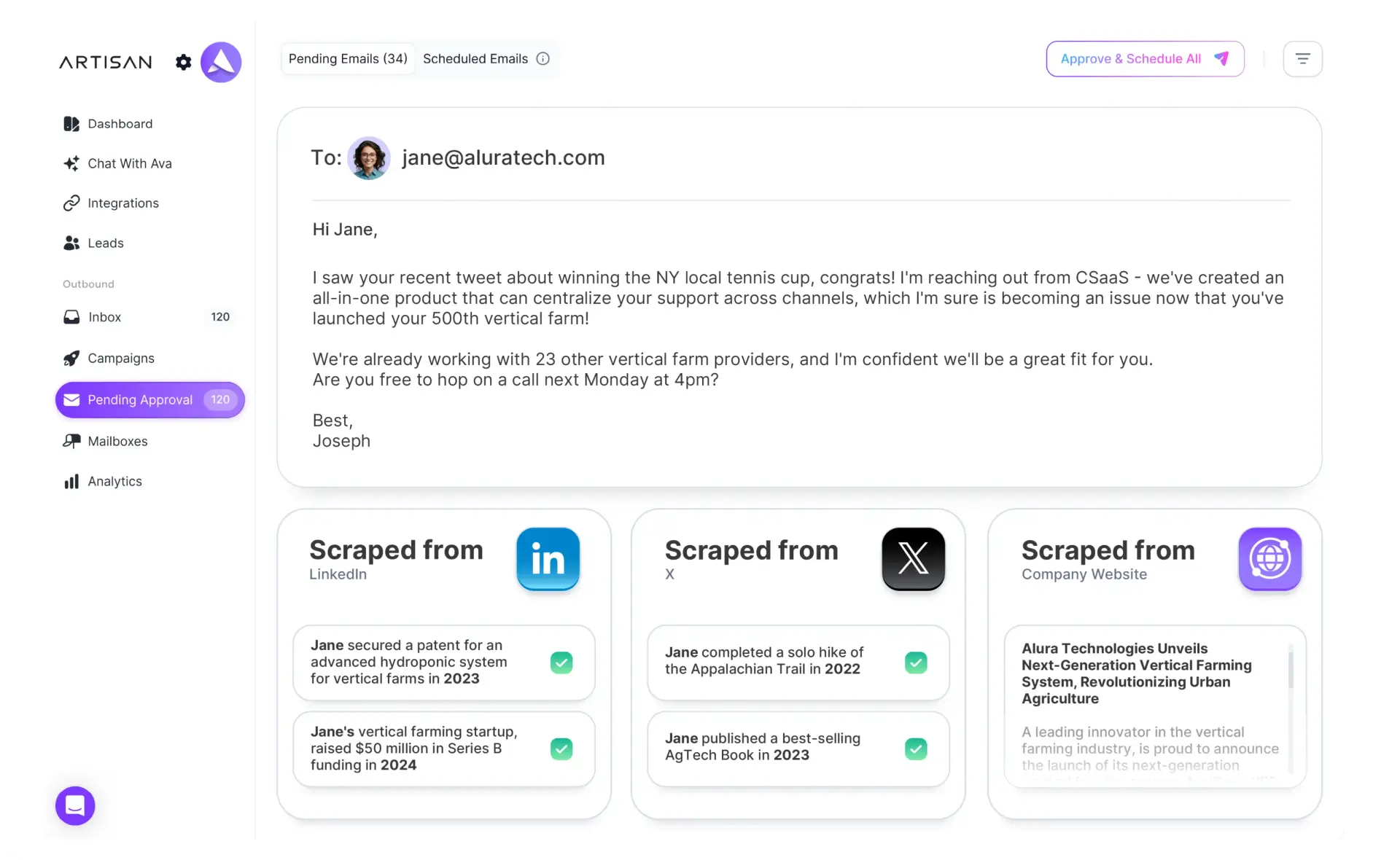How to Easily Find Local Businesses’ Email Addresses

Small businesses are the engines of the economy.
Yep, it’s nice to win those juicy enterprise accounts. However, for most B2B companies, it’s the SMBs that put food on the table.
It doesn’t matter if you’re a local business catering to other local businesses or you cater to a global market of SMBs. The way you find their valuable data remains the same.
Even better, the process is easy once you’ve understood it fully. You can find accurate, up-to-date email data quickly and cost-effectively, with a generous ROI on your sales and outreach.
7 Methods for Finding Local Business Email Addresses

Finding local business email addresses requires a multi-pronged approach. You’re most likely to find the best data if you use multiple sources.
Here’s an overview of the most effective methods:
Use high-quality local data tools
Search through local business directories
Send requests to your network
Collect public information on social media platforms
Attend networking events
Join online communities of local businesses
Keep an eye on classifieds and local ads
Let’s look at each of these strategies in more depth.
1. Use Local Data Tools
There are lots of local data tools on the market. But you don’t have to pick just one. You’ll see optimal results by using a small handful of solutions that work well together.
Local data tools work in one of two ways:
Enter a company name into the search tool to find specific addresses of key contacts.
Search a database using location and industry data for a lead contact list for larger email marketing campaigns.
Generally, it’s best to avoid purchasing lists. If you’re going to pay for email addresses, it’s better to have access to the whole database. It gives you more flexibility in applying filtering criteria and provides better value for money overall. Many providers now also offer advanced AI capabilities.
As you use local data tools, your ideal customer profiles (ICPs) and filtering processes will become more refined. If you’re reaching more potential customers and closing more deals, it’s a good sign that your marketing strategy is improving.
In addition, AI tools like Artisan take location and industry data and execute entire outreach campaigns with minimum of human input. Artisan has access to hundreds of millions of local business profiles.

2. Explore Local Business Directories
As the name suggests, local business directories list predominantly small and medium companies and are searchable by geographic area and sector.
Not all business directories publicly display email addresses, but they typically include a website link where this information can be found.
Here’s an example on Yelp:

Here’s a list of the most popular local business directories:
Yelp
Bing Places
Yellow Pages
Better Business Bureau
Angie's List
Foursquare
Facebook
Houzz
In addition to the big business directories, there are many niche ones. If you operate in a specific industry, it’s worth spending some time searching for relevant directories and mining these for email addresses.
However, if you’re struggling to find email addresses because they’re not listed on business profiles, don’t worry. Once you’ve got a list of names or websites, you can feed them into a local data tool to find email addresses. Simply treat it as a list of B2B contacts in need of enrichment.
3. Ask Your Existing Network
Recommendations are powerful. A simple LinkedIn or X (formerly Twitter) post, or a short email or direct message broadcast, can go a long way in generating introductions. And people are typically eager to share the names and details of businesses they like and value.
The key to asking your network for local business email addresses is to offer incentives and value to both the referrer and the prospect. And don’t try to hide your true intent. Be honest and focus on how you can meet business needs.
Here’s an email template you can use to ask your existing network for referrals:
Hi [colleague name],
Congrats on your [recent achievement or event].
I’m reaching out because we’ve got some openings for new clients. If you have any friends or colleagues who might benefit from our services, how would you feel about passing our name along?
We’re offering a 25% referral fee as a way of saying thanks.
Thanks again,
[Your name]
You’ll also be leveraging the powerful emotion of trust. Research shows that prospects are more likely to respond positively to recommendations. By promoting your business, the members of your network are essentially giving you a vote of confidence.
4. Social Media Platforms
Think you won’t find local data on social media platforms? Think again.
Facebook, for example, is a powerhouse of local business data. Phone numbers, emails, addresses—they’re all there. Some businesses operate exclusively through Facebook.
Here are the top social media platforms for finding local data:
Facebook
LinkedIn
X and Bluesky
Instagram
If data isn’t displayed publicly in the contact section, the direct message is your ally. Simply follow or connect with a decision maker or business account and send a concise pitch describing what you do. If you don’t hear back, send a follow-up message.

Here’s a simple template you can use:
Hi [first name],
I’m reaching out because I was impressed by your [recent achievement]. My name’s [your name] and I help businesses like [target company name] achieve [specific result].
Would you like to learn more by email?
One of the reasons this pitch is powerful is because it uses an “interest CTA,” which asks if the recipient would like more information. This CTA generates twice as many replies as alternative CTAs.
If you’re a fan of automation, there are lots of apps that will collect email addresses from social media networks for you. These providers either scrape the platform directly, or they identify accounts based on your criteria and use a lead database to find relevant contact information.
Artisan, for example, scrapes social media profiles (including LinkedIn) directly and crafts human-like messages to prospects.

If you would like to see how Artisan can improve and streamline your local business lead generation and outreach, get in touch to book a demo.
5. Networking Events and Local Meetups
This isn’t an approach that works at scale, but it’s very powerful when done well. Networking events put you in direct contact with potential buyers and allow you to compile a small but high-quality list of businesses. Often, you’ll collect the contact info of small business owners with decision-making power.
In addition, because events for SMBs are often free or tickets are priced at a nominal amount, it’s a cost-effective strategy. Plus, it’s very easy to set up an automated alert system so you're up to date with the most promising events in your area.
For example, here's the events page of the Federation of Small Businesses, a UK organization that runs hundreds of events every year:

When attending local business events, meetups, or conferences, you’ll have the opportunity to gather emails directly or share your own email. The good ol’ business card can be an invaluable tool here. Consider equipping yourself and your team with a stash.
The other dimension of this approach is sponsorship. Event organizers are always on the lookout for sponsors. Partnering with organizers can be a cost-effective part of your marketing efforts, giving you privileged access to attendees and enhancing your reputation.
6. Local Online Communities and Forums
There are many online groups where local business owners and employees gather. These are excellent places to talk about your product and create connections. Often, community members will include their email in their profiles and will be happy for you to reach out to them.
Generally speaking, there are two types of groups. Global communities for small businesses and entrepreneurs, like Reddit’s r/smallbusiness, and geographically-focused groups like Arizona Small Business owners on LinkedIn or Small Business London on Facebook.
Here’s a general overview of where to find groups:
Independent groups on platforms like Slack, WhatsApp, and Discord
Traditional online forums
LinkedIn and Facebook groups
In-person groups in your area
As a final note, avoid coming across as spammy in these groups. Focus on building a reputation and providing value. Over the long term, this is by far the best approach for generating a high-quality list of email addresses.
7. Explore Local Print Media Ads
Print media is a rich (and often overlooked) source of data for email marketing campaigns. This strategy isn’t like having a gargantuan email database with advanced filters, and the manual threshold is higher.
However, if you cater to local businesses in a specific area, classifieds and newspaper and magazine ads will often include detailed contact data. At the very least, they’ll guide you toward businesses you can research further with an email finder.
Yes, this approach takes time, but it can put you in touch with potential clients that your competitors might not even be aware of.
How to Use Artisan to Get Local Businesses Email Addresses
The fastest and most straightforward way of finding email addresses is with a database. You can use your ICP to set variables and sit back while the platform does the rest.
Artisan’s Local Data tool, powered by an AI BDR called Ava, can find email addresses for you and automate your outreach campaigns. It has a special local business setting for targeting potential customers with specific geographic and demographic attributes.
Here’s how it works:
1. Follow the prompts to set up your first campaign and select Local Data from the first dropdown.

2. Enter ICP details like the business type, locations, average Google rating, and keywords (if relevant).

3. Enter information about your offering and value proposition.

4. Select a tone and choose personalization sources (that will be used to gather personalization data).

5. Adjust your outreach flow and let Ava do the rest.

Artisan is driving consistently high response rates for its clients. It automates the whole process of writing and personalizing cold emails to local businesses. All at a fraction of the cost it would take to execute and optimize a campaign manually.
Start Building Your Local Business Email List Today With Artisan
AI is changing the way companies find local business details. AI BDRs are capable of researching and validating email addresses at scale. The result is more comprehensive and higher-quality local lead data.
In addition, they’ve given salespeople the tools they need to automate outreach to SMBs. For example, Artisan’s AI BDR, Ava, can send thousands of personalized emails a day, with follow-ups for those leads that are unresponsive.
Artisan offers the following features:
Access to a database of hundreds of millions of local business leads
Scoring and segmentation based on your target audience ICPs
Lead enrichment and email address validation with AI data scraping
Email warmup and deliverability testing with GDPR and CAN-SPAM compliance
At-scale personalization of email and LinkedIn messages
Background A/B testing and campaign optimization
Comprehensive analytics for optimizing your campaigns (bounce rates, responses, conversion rates, etc.)
If you’d like to see how Artisan can help you find and connect with more local businesses, get in touch to book a demo.
